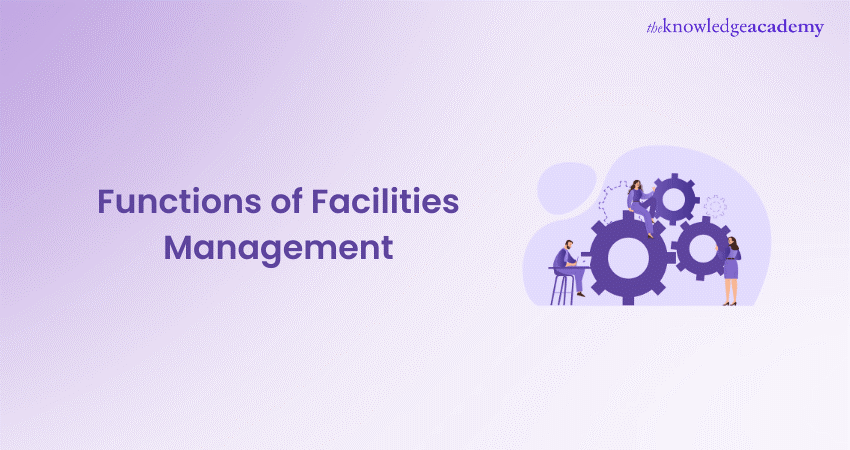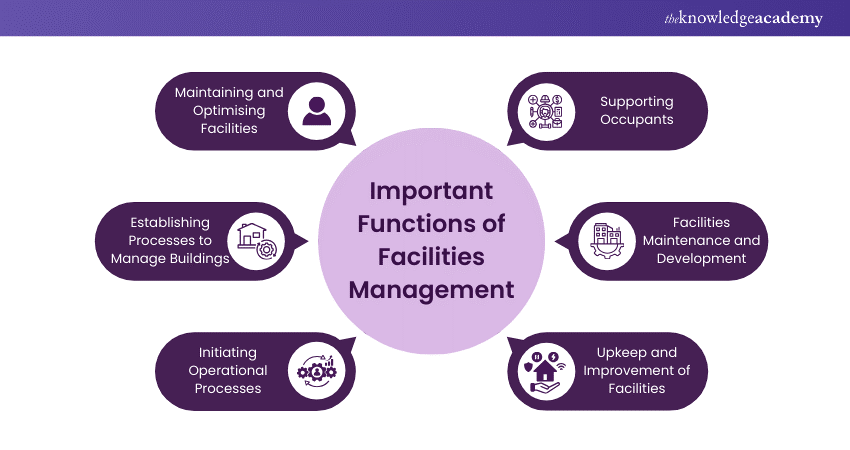We may not have the course you’re looking for. If you enquire or give us a call on +353 12338944 and speak to our training experts, we may still be able to help with your training requirements.
Training Outcomes Within Your Budget!
We ensure quality, budget-alignment, and timely delivery by our expert instructors.

Facilities Management is a vital aspect of any organisation, making sure that buildings and environments operate smoothly and efficiently. The Functions of Facilities Management encompass a wide range of activities, from maintenance and optimisation to supporting occupants and planning for future growth.
These functions are essential for creating safe, productive, and sustainable spaces that contribute significantly to the overall success of your organisation. By understanding the key Functions of Facilities Management, you can make sure that your facilities are well-maintained, efficient, and supportive of their occupants. This blog will explore these essential functions and their importance in maintaining effective operations.
Table of Contents
1) Who is a Facilities Manager?
2) The Important Functions of Facilities Management
a) Maintaining and Optimising Facilities
b) Establishing Processes to Manage Buildings
c) Initiating Operational Processes
d) Supporting Occupants
e) Facilities Maintenance and Development
f) Upkeep and Improvement of Facilities
3) Conclusion
Who is a Facilities Manager?
A facilities manager's primary duty is to oversee the daily operations of buildings and facilities. This includes ensuring that offices, factories, and other structures meet safety standards, are well-maintained, and operate efficiently.
Facilities Managers are integral to all organisational tasks related to the management and operation of facilities. Their responsibilities encompass maintenance, security, space allocation, and environmental health and safety. The ultimate goal of these functions is to create and maintain optimal working conditions for both the organisation's employees and its visitors.
The Important Functions of Facilities Management
Now that you are aware of who a Facilities Manager is and the roles they play, let's explore their important functions in detail.

1) Maintaining and Optimising Facilities
Maintaining and optimising facilities is a fundamental function of Facilities Management. This involves regular inspections, repairs, and upgrades to ensure that all systems and structures are in good working order. This way, you can prevent costly breakdowns and ensure that everything runs smoothly. Optimising facilities also means making them more efficient and sustainable, reducing energy consumption and improving the overall environment.
Imagine a world where buildings are like well-oiled machines, running smoothly without a hitch. That's what maintaining and optimising facilities is all about. Regular check-ups and repairs keep everything in tip-top shape. It's like going to the doctor for a check-up but for buildings. Just like eating healthily makes you feel good, making buildings more efficient and sustainable is like giving them a healthy diet. It reduces energy consumption and creates a better environment for everyone.
2) Establishing Processes to Manage Buildings
Establishing processes to manage buildings is another key function. This includes creating and implementing procedures for routine tasks, such as cleaning, security, and waste management. By having clear processes in place, you can ensure that these tasks are carried out consistently and effectively, minimising disruptions and maintaining a high standard of service.
Think of establishing processes as setting up a game plan. Just like a coach creates a strategy for the team, facilities managers create procedures for the building. Cleaning, security, and waste management are like the plays in the game plan. When everyone knows their role and follows the plan, the building runs like a winning team. This minimises disruptions and keeps everything running smoothly, just like a well-coached team on game day.
Step into the world of Facilities Management Training – expert training awaits to elevate your professional path!
3) Initiating Operational Processes
Initiating operational processes involves setting up and managing the day-to-day operations of a facility. This includes everything from managing budgets and resources to overseeing staff and contractors. Effective operational processes are essential for ensuring that facilities run smoothly and efficiently, allowing organisations to focus on their core activities.
Operational processes are like the engine of a car. They keep everything moving and running smoothly. Managing budgets and resources is like making sure the car has enough fuel and oil. Overseeing staff and contractors is like making sure the engine parts are working together. When everything is in sync, the car runs smoothly, and so does the building.
4) Supporting Occupants
Supporting occupants is a crucial aspect of Facilities Management. This means ensuring that the people who use the facilities have everything they need to work safely and comfortably. It includes providing adequate lighting, heating, and ventilation, as well as addressing any issues or concerns that occupants may have. By supporting occupants, you can create a positive and productive environment.
Think about how you feel when you're in a comfortable, well-lit room versus a dark, stuffy one. Supporting occupants is all about creating a comfortable environment. It's like making sure everyone in a house has a cosy bed and a warm blanket. When people are comfortable, they can focus better and be more productive.
Discover top-notch training with our expert-led Industry Training and take your career to the next level today!
5) Facilities Maintenance and Development
Facilities maintenance and development involve keeping facilities in good condition and planning for future growth. This includes routine maintenance tasks, like cleaning and repairs, as well as larger projects, such as renovations and expansions. By maintaining and developing facilities, you can making sure they continue to meet the needs of their users and remain functional and attractive.
Think of it like taking care of a garden. Routine maintenance is like watering the plants and pulling weeds, keeping everything neat and healthy. Development is like planting new flowers and expanding the garden. Both are necessary to keep the garden beautiful and thriving.
6) Upkeep and Improvement of Facilities
Upkeeping and improving facilities is about more than just maintenance. It involves making continuous improvements to enhance the functionality, efficiency, and sustainability of facilities. This can include upgrading systems and equipment, implementing new technologies, and making changes to improve the overall environment. By focusing on upkeep and improvement, you can ensure that facilities remain at their best.
Imagine you're building a sandcastle. Maintenance is like fixing the walls and towers that might crumble. Improvement is like adding new towers, making the castle bigger and better. Continuous improvement keeps the facilities modern and efficient, just like adding new features to your sandcastle.
Conclusion
Understanding the Functions of Facilities Management is essential for making sure that buildings and environments are well-maintained, efficient, and supportive of their occupants. By focusing on maintenance, processes, operations, support, development, and improvement, facilities managers can create spaces that are safe, efficient, and productive. It plays a crucial role in the success of any organisation, making it an indispensable part of modern business operations.
Become a Risk Management Pro: Risk Management Black Belt awaits to sharpen your strategic decision-making skills!
Frequently Asked Questions

The scope and extent of the Facilities Management Function include maintaining and optimising buildings, establishing processes, supporting occupants, and planning for future development and improvements.

The four main functions of a facility manager are maintenance and operations, project management, safety and compliance, and space planning and management.

The Knowledge Academy takes global learning to new heights, offering over 30,000 online courses across 490+ locations in 220 countries. This expansive reach ensures accessibility and convenience for learners worldwide.
Alongside our diverse Online Course Catalogue, encompassing 17 major categories, we go the extra mile by providing a plethora of free educational Online Resources like News updates, Blogs, videos, webinars, and interview questions. Tailoring learning experiences further, professionals can maximise value with customisable Course Bundles of TKA

The Knowledge Academy’s Knowledge Pass, a prepaid voucher, adds another layer of flexibility, allowing course bookings over a 12-month period. Join us on a journey where education knows no bounds.

The Knowledge Academy offers various Industry Training, including Facilities Management Training, Facilitation Skills Training, Product Management Training and Logistics Management Training. These courses cater to different skill levels, providing comprehensive insights into Facilitation Techniques.
Our Business Skills Blogs cover a range of topics related to Facilities Management, offering valuable resources, best practices, and industry insights. Whether you are a beginner or looking to advance your Business skills, The Knowledge Academy's diverse courses and informative blogs have got you covered.
Upcoming Business Skills Resources Batches & Dates
Date
 Facilities Management Training
Facilities Management Training
Fri 24th Jan 2025
Fri 28th Feb 2025
Fri 30th May 2025
Fri 15th Aug 2025
Fri 26th Sep 2025
Fri 31st Oct 2025







 Top Rated Course
Top Rated Course



 If you wish to make any changes to your course, please
If you wish to make any changes to your course, please


